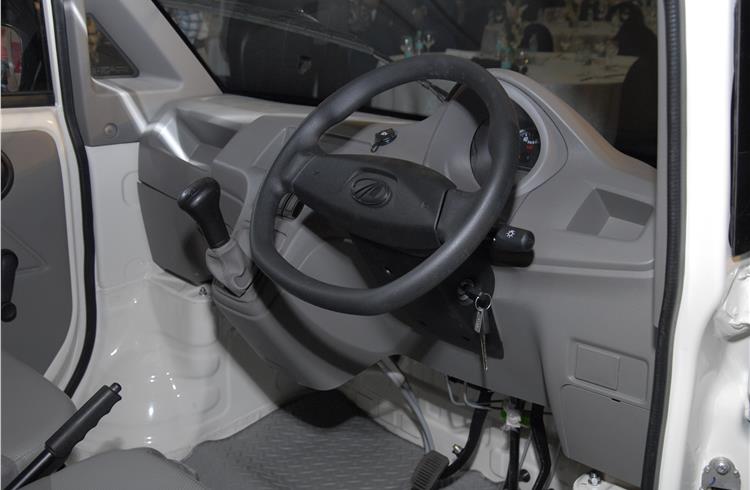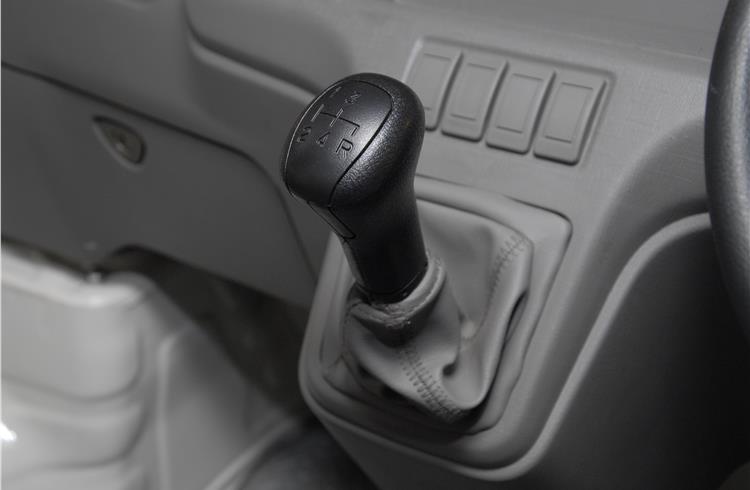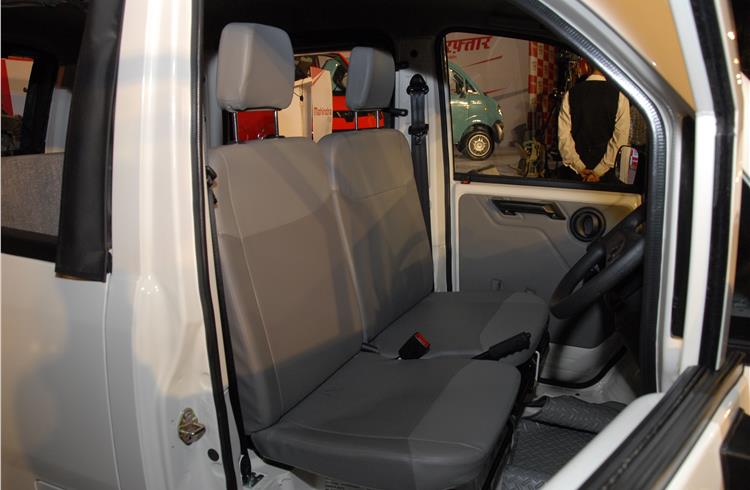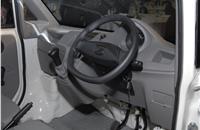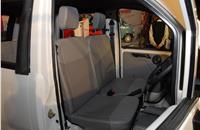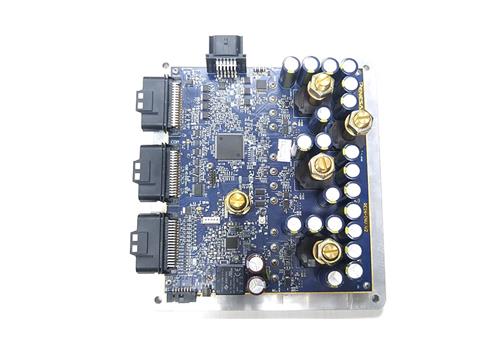Mahindra launches Jeeto Minivan at Rs 345,000
Emboldened by the success of the Jeeto goods carrier, M&M rolls out passenger carrier and targets three-wheeler owners looking for an upgrade.
A little over two years after it launched the Jeeto mini-truck, which replaced the Gio small commercial vehicle (SCV), Mahindra & Mahindra today launched the Jeeto Minivan, with a starting price of Rs 345,000. Emboldened by the success of the Jeeto SCV, which has eaten into Tata Motors’ market share, M&M has used the Jeeto platform to target the passenger transportation sector with the new Jeeto model.
Developed on the Jeeto platform designed for cargo and passenger carriers, the Jeeto Minivan passenger carrier is targeted at urban and semi-urban transportation and will cater to last-mile connectivity, contract and stage carriage for tour/travel and intra-city people movement.
The Jeeto Minivan is available in two body forms – hard-top and semi-hard-top – and in diesel, petrol and CNG. The vehicle is powered by the m_Dura, a direct injection, BS IV engine which develops 16hp and torque of 38 Nm. Claimed to deliver best-in-class fuel efficiency of 26 kilometres per litre, the Jeeto Minivan offers lower maintenance cost, carlike driveability, a spacious cabin and well-cushioned seating, according to M&M.
Speaking at the launch of the Jeeto Minivan in Mumbai, Rajan Wadhera, president, Automotive Sector, M&M said, “The Jeeto brand has already set new benchmarks and the Jeeto Minivan will further extend this platform for last-mile passenger transportation. We have identified specific need gaps amongst customers and I am sure that the Jeeto Minivan will provide a more efficient, safe and comfortable mode of transportation. It will also be an ideal option for three-wheeler customers to upgrade.”
In a bid to attract three-wheeler customers, the company has introduced attractive exchange and finance schemes for the Jeeto Minivan with significantly low down payment options and a longer tenure for affordable EMIs.
The Jeeto Minivan comes with a warranty of two years/40,000km (whichever is earlier) in three colours – Sunrise Red, Ultramarine Blue and Diamond White. The vehicle will be launched in a phased manner. In Phase 1, the semi-hard-top diesel variant will be launched, followed by the hard-top CNG and diesel variants and the semi-hard-top CNG and petrol variants.
The company already has an installed capacity of 90,000 units for its Jeeto platform. Mahindra’s CV portfolio currently boasts of one of the widest range of three-wheelers, small, medium and heavy commercial vehicle which under five platforms and 10 brands consists of a total offering of 63 variants.
Speaking with Autocar Professional, Wadhera commenting on optimism towards government regulations on four-wheeler passenger transport and future of EV’s said, “There is a lack of adequate new-age mobility needs in the urban area. Jeeto is not aimed at replacing three-wheelers; it is a product that we have created and we will let the demand from consumers decide how do they see our product. We are optimistic on the target set by the government of achieving an all-electric vehicle fleet by 2030. In Delhi, you already see a lot of e-rickshaws ploughing on the road, as well as the CNG adoption in three-wheelers was brought in by the government. Similarly, with the target set by the government on EVs, I believe it will first come in the commercial vehicle segment, in some geographies which later will be a norm across the country.”
Q&A: RAJAN WADHERA, PRESIDENT, AUTOMOTIVE SECTOR, MAHINDRA & MAHINDRA
What is your outlook for the van segment in India?
The passenger segment has been flat this year but two years prior to that it witnessed de-growth. In 2016, we grew at around 4 percent, with a peak of about 15,000 a month. Sales in the category have now come down to 12,000.
This segment is going to grow with smart cities, last-mile connectivity, congestion, people switching to shared mobility and travelling from metro stations to their destination. People will look towards better and safer ways to travel. As affordability goes up, people are willing to pay more for better safer travel. The three-wheeler may not be able to fill in the gap and aspirations of the traveller, consequently we are poised to take the growth.
How much of investment and effort has gone into the new Jeeto Minivan?
The total cost of the Jeeto platform was Rs 500 crore, where Rs 350 crore went towards the load carrier, and the balance Rs 150 crore went towards the passenger version for developing the CNG, diesel and petrol variant.
How do you view demand for the Jeeto cargo vehicle with GST in place?
Veejay Nakra: Jeeto is a small-platform vehicle, it is not required to carry heavy loads, it is meant for short trips within the city. It is targeted at e-commerce companies and aggregators, transporters and logistics service providers where we see a huge opportunity.
Post-GST, the whole automotive industry will see benefits. For Jeeto, e-commerce and Swacch Bharat have helped drive growth. The initiative has helped the platform and product; we were the first company in India to sell more than 2,000 Jeetos to the Telangana government, which uses it as a tipper and garbage collection van. We foresee similar demand from other states as well.
Do you plan to introduce an electric variant of the Jeeto Minivan? How is market demand for the electric variant of the Supro?
Typically the segment is more of a wait-and-watch segment. More and more of a regulatory thrust will push people. Many years ago, there was poor demand for CNG vehicles but it rose when the government strengthened the CNG infrastructure and compelled three-wheelers to switch to the cleaner fuel.
With the year 2030 being announced by the government for an all- electric vehicle fleet, all these things will fall into place. We are getting experience and an understanding of what the consumer wants. We are rightly poised for growth.
I am optimistic that EV adaptation and growth will first come in the commercial vehicle sector. Also, it will start only with certain markets in the country as it would not be possible to be rolled out across India at the same time.
RELATED ARTICLES
Tata Elxsi-Renesas MCU for EVs enables cost optimisation, speedier time to market
Modular, scalable design of Motor Control Unit enables integration across diverse EV applications. Claimed to be reduce ...
Bosch hydrogen engine tech-powered truck to be on Indian roads this year
The global supplier of technology and services is betting big on both electromobility and hydrogen. While announcing the...
IIT Bombay inaugurates Arun Firodia Research Floor
IIT Bombay, one of India’s top technical and research institutions, honours Kinetic Group chairman Dr Arun Firodia, one ...





 By Autocar Pro News Desk
By Autocar Pro News Desk
 13 Jul 2017
13 Jul 2017
 15459 Views
15459 Views



